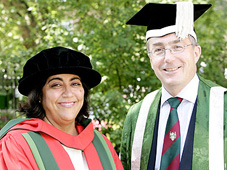From Southall to Southfork is an unlikely journey, but this Asian shopkeeper's daughter is so resourceful she could sell oil to JR Ewing. Having rejected her school's advice to be a secretary, she made Asian cinema mainstream with Bend It Like Beckham, Bride and Prejudice and her latest film Angus, Thongs and Perfect Snogging.
Chadha's parents were immigrants from Kenya, although they maintained close links to India, where her father had worked for a time in banking. (The family was originally from the Punjab.) They didn't find life in Britain particularly easy. It was scarcely a privileged upbringing, and Gurinder was not encouraged to be ambitious by the world at large. As her father's shops ran into trouble and the Chadhas moved around, she kept changing schools. 'Eventually I got to one where they stuck me in the B or even C stream, where I could only take CSEs instead of O-levels. And I was like: "I think you're making a mistake here." But I was 14, 15, and I didn't really know how to handle it. Then I got all grade ones and the teachers were like: "We think we put you in the wrong set" ...'
When she decided she wanted to go to the University of East Anglia to do development studies, her teachers suggested a secretarial course, or a lesser university. Gurinder didn't take any notice, perhaps because she'd already developed an insider-outsider's habit of independence. 'I knew from an early age that people didn't see the different sides of me. I formulated a kind of bicultural identity quite early and I was always very comfortable with it, but I knew people didn't quite see that. So when teachers said to me: "You should do a secretarial course," I was like: "You're bloody nuts. I don't know what I'm going to do, but I'm not going to do that. You've got me wrong".'
Other people's readiness to dismiss her only made her more determined. 'Experiences like that, and seeing my parents struggle, made me think: "You don't believe I can do that, so I'm going to prove you're wrong. If you tell me I can't do something, that's the worst thing to tell me. And that's what I tell girls, and what Beckham's about: you can do it, you can do it better, and you can do it in the way you want.'
She did get to UEA, and for her degree spent a year in Amritsar, which would later be the setting for Bride and Prejudice. Most of her fellow students went to work in charities but she sensed that the media might suit her better. She took a radio course, worked in radio and television, and claims her film-making still owes a lot to journalism. Making “Who Do You Think You Are?” made me realize a lot of things about who I am,' Chadha says. 'My story is the story of empire.' A product of globalization before the term was properly invented, she is grateful for the breadth she draws from her richly textured heritage. She was awarded the O.B.E. (Officer of the Order of the British Empire) in the 2006 Queen's Birthday Honors List for her services to the British Film Industry.
She is married to Paul Mayeda Berges a Japanese American. Their first film together was “What's Cooking?” about four culturally diverse American families (Jewish, African-American, Latino, Vietnamese) celebrating Thanksgiving. The couple live in Soho, with frequent visits to Southall, where her mother still lives, and to America. She does all the cooking and claims he can't even switch on the oven.
At first, casual glance, Chadha's progression from Asian niche film-maker to blockbuster director has been remarkably fast and smooth. But there was a long period after “Bhaji on the Beach” when she'd proved that she could make a good film but wasn't seen as commercial. “What's Cooking?” took years to get financed, and then only had an art-house release. It might have been easy to become disheartened and accept the apparent estimation of her as an interesting director of films for a minority audience.
She wasn't having any of it, convinced that 'I tell stories about people audiences might think they have nothing in common with, but then they emotionally connect with them and find they're not different at all.' She was finally, conclusively proved right about this with Bend It Like Beckham, a film about a highly specific autobiographical, community in a particular place and time that was loved around the world. Beckham was partly reflecting her own efforts to manage her adolescence, 'what's the phrase? - on a need-to-know basis'.
Out of the various identities on offer to her - Asian, British, Sikh, wife of an American, girl from Southall, international film director - she has put together one that works, avoiding easy categorization, determinedly seeing culture as opportunity rather than constraint. When she talks about her films, it's always in terms of the stories, the drama, and the points of maximum emotion. But there is a serious, even political, underlying intent: 'I think the reason I have the drive I do is ultimately about racism. It's about finding ways to diminish the impact of difference.'
Courtesy of www.guardian.co.uk
Filmography
Angus, Thongs and Perfect Snogging (2008)
Paris, je t'aime (2006) segment "Quais de Seine"
The Mistress of Spices (2005) (screenplay only)
Bride and Prejudice (2004)
Bend It Like Beckham (2002)
What's Cooking? (2000)
Rich Deceiver (1995), BBC two-part drama
A Nice Arrangement (1994)
What Do You Call an Indian Woman Who's Funny? (1994)
Bhaji on the Beach (1993)
Acting Our Age (1992)
Pain, Passion and Profit (1992) (V)
I'm British But... (1990) (TV)
    
Check out more from Gurinder Chadha on her blog.
|
|
 Gurinder with her twin children
at the release of her latest film
Gurinder with her twin children
at the release of her latest film
Disney films
'have lost innocence'
The director of British hit Bend It Like Beckham believes the 'wonderment' of classic children's films has been lost because producers are banking on movies made for all age groups Award-winning film director Gurinder Chadha is calling for more films to be made specifically for children, claiming that blockbusters made by companies such as Disney have lost a sense of 'innocence and wonderment' because producers are banking on movies made for allage groups. Chadha, 47, cited her memories of a childhood favourite of her own, a little-known Disney film called Pablo and the Dancing Chihuahua, about a Mexican boy travelling with his dog. 'I was transported to Mexico and to the desert, to this happy little dog and to this boy trying to go on an adventure,' she said. 'Now that was a proper kids film. Unfortunately I don't think people want to make those kinds of films any more - which is why I'm going to do one next. I want to make a proper kids adventure film, about a British child on an adventure in India, with lots of animals involved along the way. She hopes it will be the first of a series.

Conferment of D.Litt honoris causa in July 2006
courtesy: www.leeds.ac.uk
Personal Quote:
"I knew from an early age that people didn't see the different sides of me. I formulated a kind of bi-cultural identity quite early and I was always very comfortable with it, but I knew people didn't quite see that."

Preservation & Renovation
of Sikh Memoriblia:
Sikh Arts, Monuments and Manuscripts in deep jeopardy:
On 18th July2008, Gurinder Chadha interviewed Dr. Narinder Kapany at the Victoria & Albert Museum in London on the preservation & restoration of our Sikh heritage.
“We live in a time when it is easy to forget the value of the past. We are surrounded by the lure of modernity and bombarded by incessant messages about the value of almost anything new. As a result, the works of our cultural and artistic heritage often languish due to the benign neglect or simple lack of attention. In more extreme cases, great monuments have been willfully destroyed, most memorably when theTALIBAN dynamited the 1500 year old Buddha statues in 2001-a UNESCO World Heritage Site – on the grounds that they wereidols, which are forbidden under Sharia law. The world’s outrage at this atrocity was a clear reminder that we do in fact understand the price we collectively pay – no matter what our religion –when any cultural asset is lost or destroyed, for whatever reasons.”
Read more |

